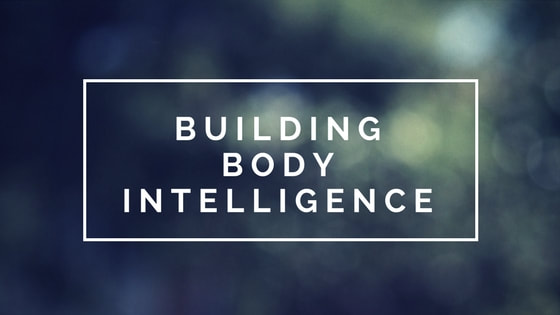|
Looking after your mental health involves more than fine-tuning your mental activity (i.e., thoughts, attitudes and beliefs) and expressing your emotions in an adaptive, helpful way. Your brain is housed in your body, so it makes sense that the more in-tune you are with your body, the better your mental health will be (and vice versa). You have likely heard about emotional intelligence and social intelligence as popularised by Daniel Goleman, though you might not be so familiar with the concept of body intelligence (BQ) yet. In an article published in 2010, Jim Gavin, Ph.D, refers to BQ as “how aware you are of your body (awareness), what you know (knowledge) and what you actually do for and with your body (engagement).” Practice diaphragmatic breathing When you start building awareness to your breath, you will be shocked to realise how shallow you breathe most of the time, and even more so when you’re feeling stressed, overwhelmed or multi-tasking. The lower abdominal space often gets neglected in our awareness. In particular, highly anxious individuals tend to require more time to start feeling sensations in their torso region because if you’re experiencing unpleasant sensations day after day in that region, it makes sense that the brain ‘blocks’ this out from awareness over time. So by consciously breathing from your diaphragm, you’re not only switching from the ‘fight-flight-freeze’ response to the ‘rest and digest’ system, but you are also reminding your brain that your lower abdomen exists so it can automatically bring it into play at the first sign of a stress response. Complete body scans throughout your day Body scans don’t have to be formal meditations that last for over 30 minutes. Of course, doing 30-60 minutes of formal meditation each day will significantly develop your body intelligence over an 8 - 12 week period. Though as a start, all you need to do is focus your awareness from the top of your head scanning it down to the tips of your toes. You may feel sensations in some parts and feel nothing in other parts. Simply accept whatever your experience is and continue scanning. Strengthen your core  There is no doubt that physical activity gives you a greater awareness of your body, improves energy and mood. Building good core strength is essential for many reasons, one of which is that if you start aerobic exercises on an unstable spine and core, it increases inflammation and the stress response, which could then lead to pain and injury (then back on the couch we go). Oh and I’m not talking about doing hundreds of crunches either, the abdominal muscles don’t atrophy (i.e., waste away) as quickly as the back muscles. A simple exercise to start with is to lay on the floor with your hands by your side, palms facing down, bending your legs shoulder width apart. Lift your trunk off the floor as far as possible, keeping your spine straight and hold for 30-60 seconds before gently bringing your trunk down again. Doing this 10-15 times, a few times a day is a good place to start when bringing exercise into your day. There is such a thing as too much exercise. I would suggest starting off with a personal trainer to develop a program that suits your individual needs and that tends to get the momentum going. I can’t write about body intelligence without mentioning yoga or tai-chi, the moving meditations of the exercise world. Usually, intense exercise consists of ‘not listening’ to your body so you can complete the exercise, whereas the focus of yoga and ta-chi is listening closely to what your body telling you without over-exerting yourself, yet still challenging yourself. Eat a varied, plant-based diet and avoid highly processed foods There is so much research out there about what foods to eat, what foods to avoid and sometimes it feels like this changes every second week. All I can say is be a critical thinker when it comes to media telling you what the latest research has indicated about diet. Good quality human research is highly complicated and unfortunately what you hear on the TV or read in a magazine is often a very reductionist perspective.
Basing each meal around plant-based food is all you need to focus on. If you’re buying packaged foods and you can’t pronounce the ingredients and they sound more like a chemical concoction – it’s less ‘food’ and more ‘science experiment’. The gut is your ‘second brain’ so if you’re interested in increasing your knowledge on this, check out the book I’ve recommended below. Have regular massages and consider chiropractic care Getting your partner to give you a massage (it will likely be a brief experience!) will not only get your brain to remember that body part exists, it feels great, reduces tension and is a great way to bond together. Parents, briefly massaging your kids is also a great daily practice either in the morning or night. Alternatively, include some remedial massage into your self-care practices and you will love yourself for it! Chiropractic care is about improving the neural connectivity between your brain and the rest of your body. Hello BQ! Best to speak to a chiropractor for more information on this. Comments are closed.
|
Categories
All
|
Hopscotch & HarmonyAt Hopscotch & Harmony Psychology, you can expect compassionate care and evidence-based guidance on your journey to wellness.
With clinics in Werribee and Belmont, as well as providing online counselling to clients who live throughout Australia, our dedicated team of psychologists and dietitians are committed to providing support to children, teenagers and adults. With a focus on understanding your unique needs, we offer tailored solutions to foster growth and resilience. Trust in our experience and dedication as we work together towards your well-being. Welcome to a place where healing begins and possibilities abound. |
Our services |
Contact usHopscotch & Harmony
Child, Teen and Adult Psychology Our Locations:
WERRIBEE: 1/167-179 Shaws Rd
BELMONT: 92 Roslyn Rd AUSTRALIA-WIDE: Online counselling |
Hopscotch and Harmony respectfully recognise the Aboriginal and Torres Strait Islander people as the first Peoples of the continent now called Australia.
We acknowledge the Bunurong and Wadawurrung people of the Kulin Nation, the traditional owners of the land on which we work, and pay our respects to their Elders, past, present and emerging.
© 2024 Hopscotch and Harmony Pty Ltd




 RSS Feed
RSS Feed
